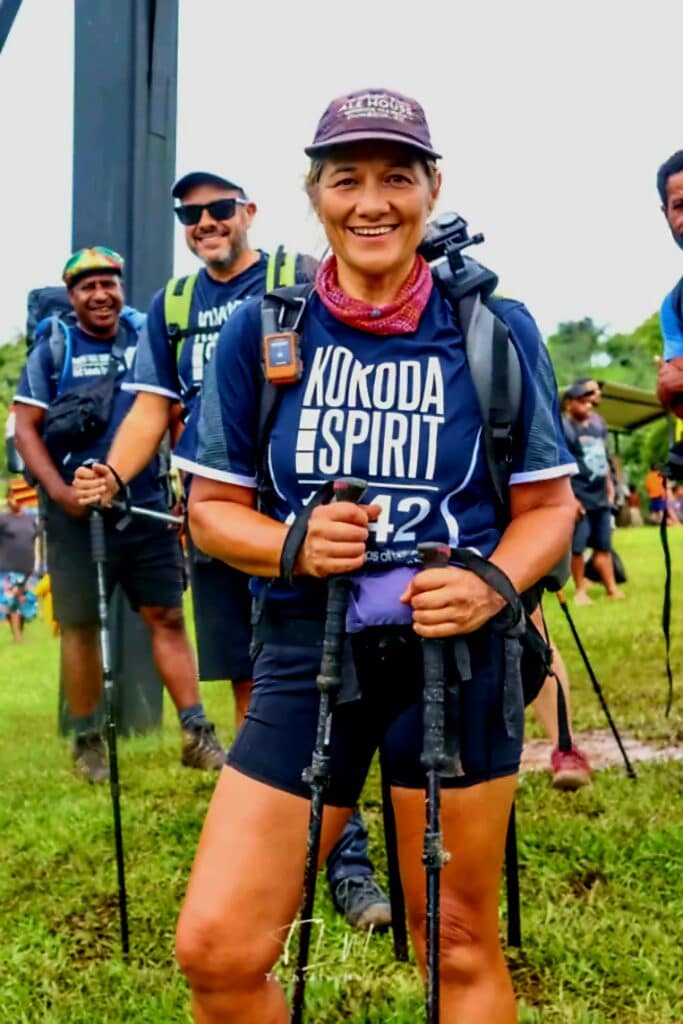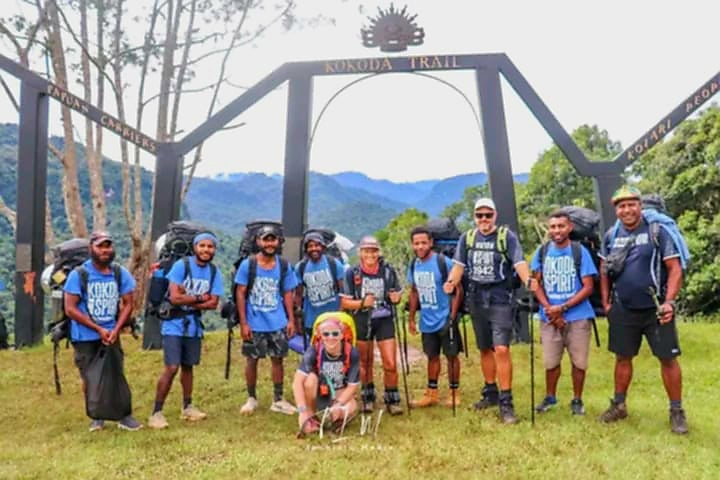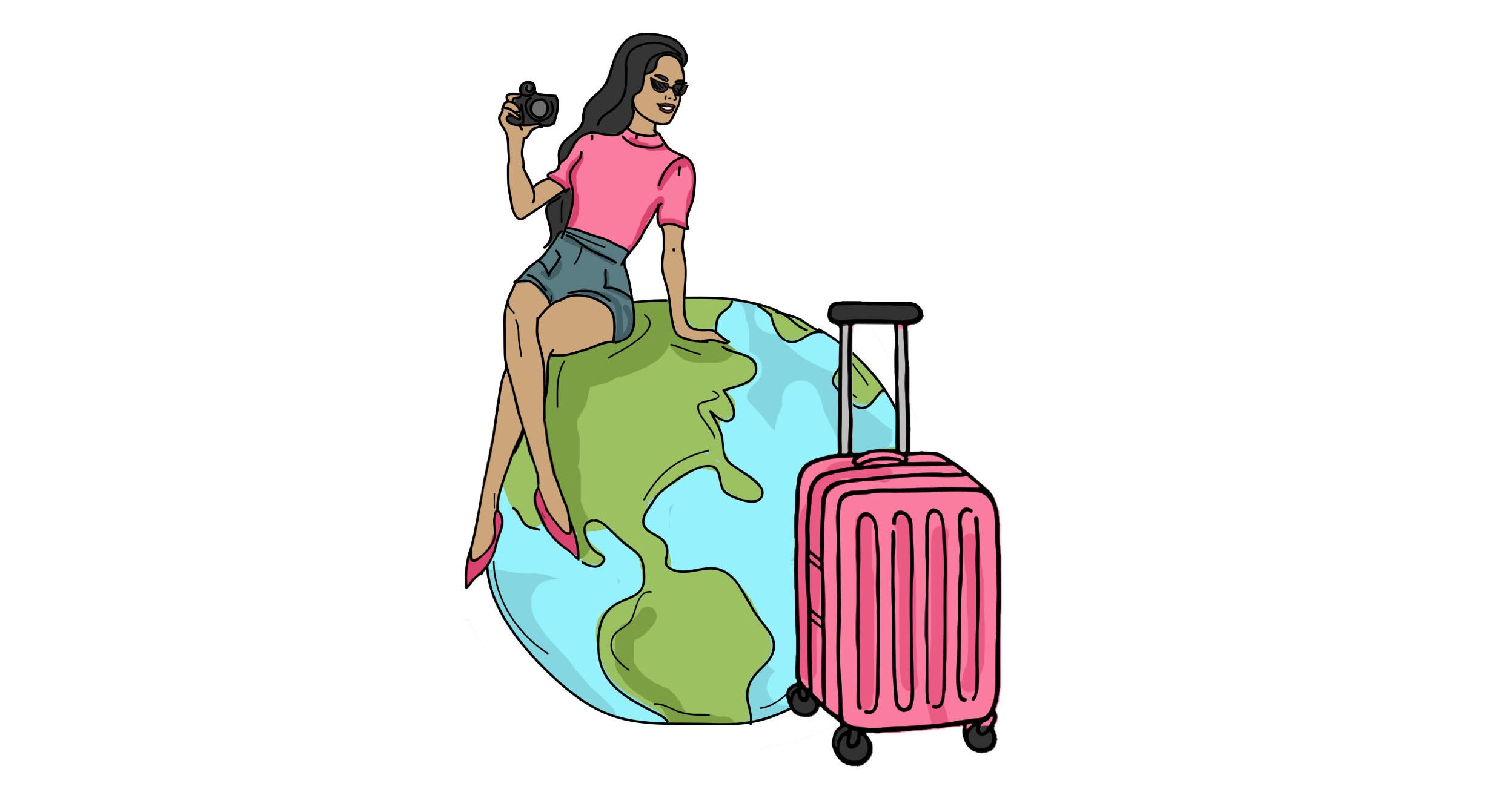
The Porters of Kokoda are the Heart of the trail. They walk beside you, carry your gear, guide your steps, and lift your spirits when it gets hard — and it will get hard. The Porters are often called the true heroes of Kokoda, and after walking it myself, I understand why.
I usually travel solo across Outback Australia in my 4×4. Remote roads, red dust, and the stillness you find in the desert, that’s my comfort zone. But trekking the Kokoda Trail in Papua New Guinea was something else entirely — one of the hardest, most rewarding things I’ve ever done.
In my post, The Kokoda Trail: What It’s Really Like for First-Time Trekkers, I shared my experience taking on this mighty Trail. But behind every muddy climb, river crossing, and moment of doubt were the porters. This post is about them. The strength they carry, the culture they represent, and the legacy they walk with every single day.
Where are the Porters from?
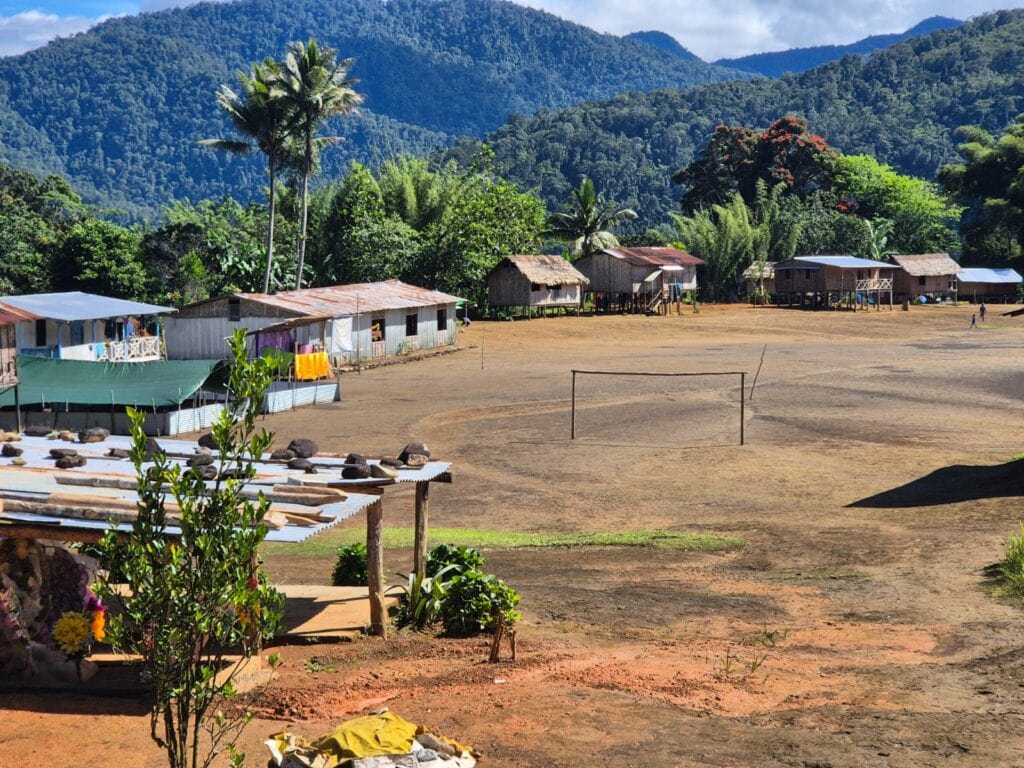
When I was on the track all our Porters were Koiari people . The majority of porters on the Kokoda Trail are Koiari men. They come from the Koiari people, whose traditional lands cover much of the southern section of the trail. This is particularly true around Owers Corner, Efogi, and Menari. They are the direct descendants of the villagers who helped Australian soldiers during WWII and became known as the Fuzzy Wuzzy Angels.
In the northern sections of the trail, especially closer to Kokoda Station, you’ll also find porters from the Orokaiva people.
Koiari porters remain the most prominent and consistent group working along the track.
The Fuzzy Wuzzy Angels
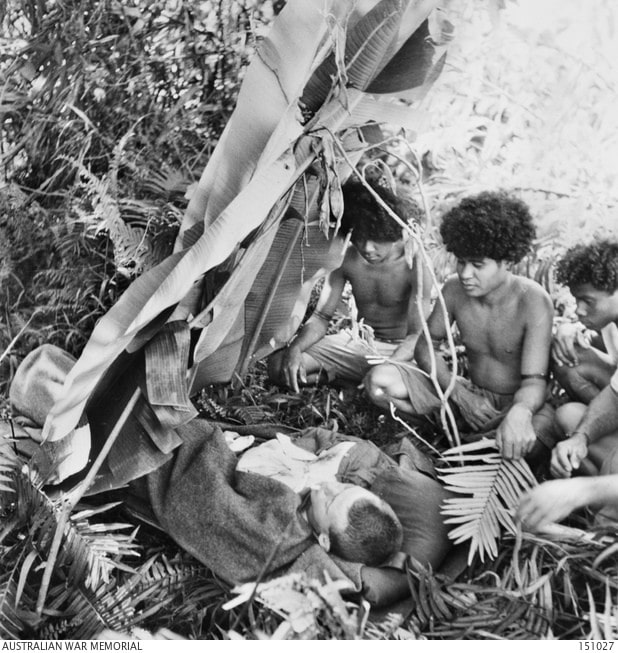
During World War II, villagers along the Kokoda Trail — many of them Koiari — played a vital role in the campaign to defend Papua. They carried supplies, evacuated the wounded, and helped guide Australian troops through some of the most unforgiving terrain on earth.
Australian soldiers came to call them the Fuzzy Wuzzy Angels — a name steeped in affection, but also shaped by colonial attitudes and language that overlooked the realities of what these men endured.
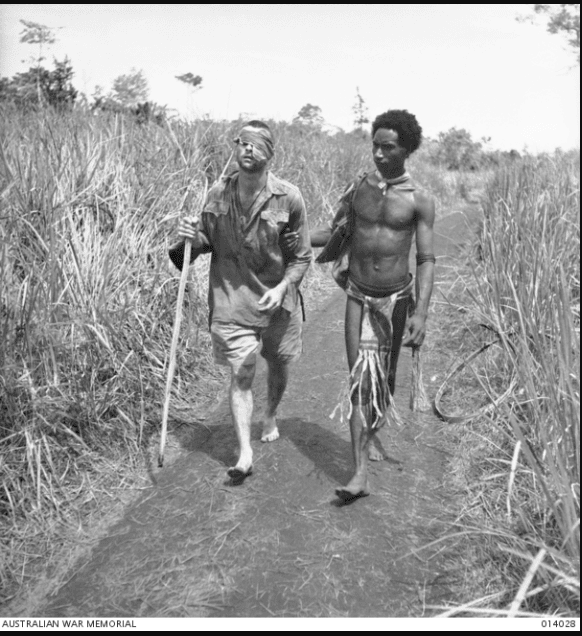
The truth is more complex. These Papuan men weren’t volunteers — they were often indentured labourers, conscripted under Australian military direction. They walked barefoot, underfed, often without proper shelter, and were given little say in the matter. Many were teenagers. They did what they were asked under extreme conditions — but they weren’t treated as equals.
And yet, their care and courage were undeniable. Countless Australian lives were saved because of them. That contribution wasn’t symbolic — it was essential. Without their support, the outcome of the Kokoda campaign in WWII would have been very different. For more in-depth reading on the Fuzzy Wuzzy Angels head to the Australian War Memorial site.
Today’s porters are direct descendants of those men. When you walk the Kokoda Trail, you’re walking with people whose families have walked it for generations — not just in wartime, but in everyday life.

Porters today carry more than gear — they carry a legacy. A legacy of strength, resilience, and deep connection to Country.
Cultural Exchange on the Trail
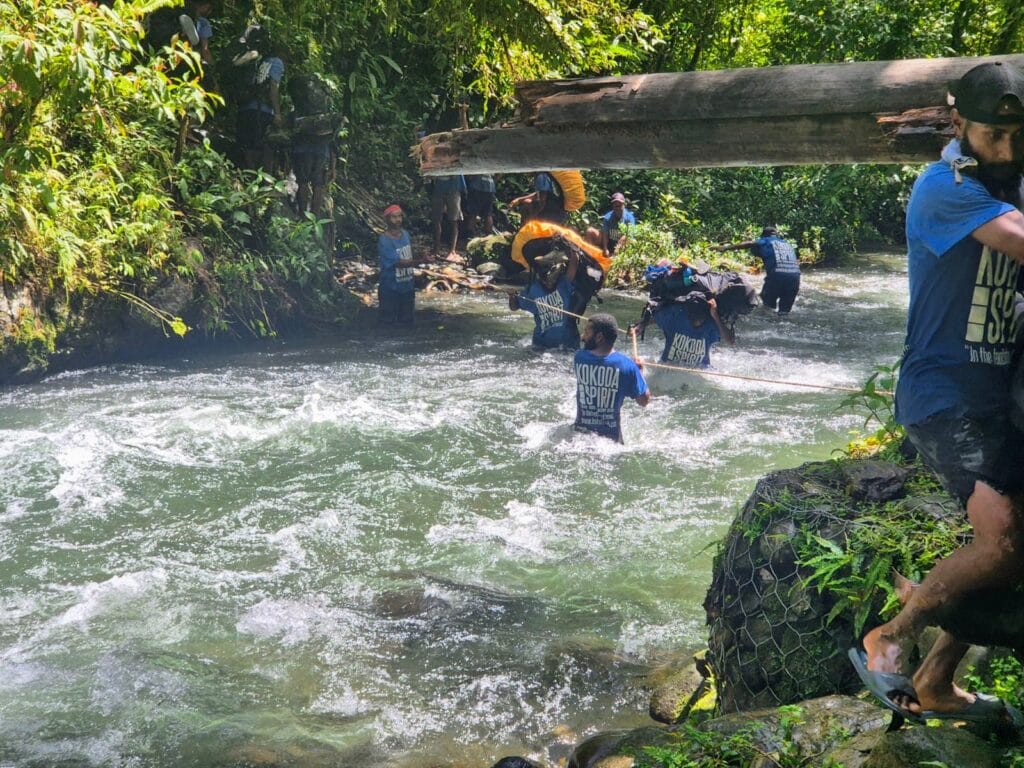
Walking with a Kokoda porter isn’t just practical — it’s a cultural exchange. Along the way, porters often share insights that connect you to the land and their traditions.
Your porter may:
- Share knowledge of bush medicine, using native plants
- Teach you phrases in Tok Pisin or their local dialect
- Sing traditional and gospel songs passed down through generations
- Point out native wildlife — ours showed us a Bird of Paradise, which was a real highlight
You’ll also see the quiet influence of PNG’s wantok system — a cultural value rooted in kinship, shared responsibility, and looking out for one another. These small moments aren’t part of the itinerary, but they often become the most memorable.
How Are the Porters Chosen?
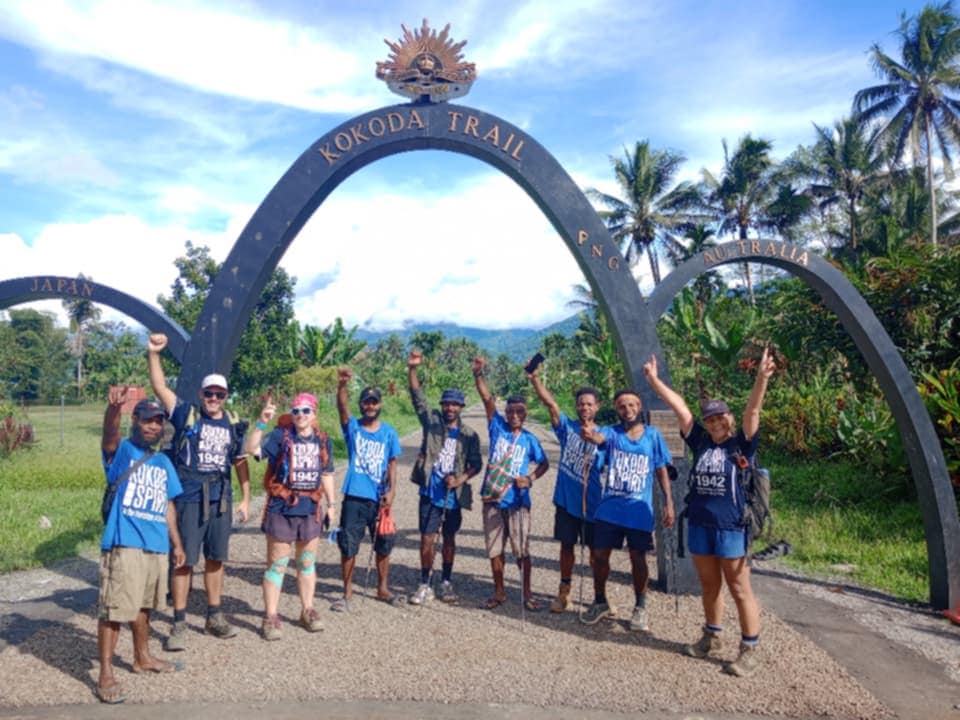
Porters aren’t randomly selected — they’re carefully chosen. The Trek Master in my group explained that porters need to speak and understand English, be courteous, respectful, reliable, and physically strong.
Many have walked the trail countless times. Most are between 19 and 40 years old and all come from villages along the track, with deep connections to the land and culture.
Some operators also prioritise those with first aid training, leadership potential, or prior experience supporting trekkers through tough conditions. There’s pride in the role — and it shows.
One day, as we passed a village school, I joked with a porter that the kids must find it funny watching sweaty hikers struggle past their classrooms everyday. He smiled and said, “They know who you are. Their parents are porters. And many of them will be too.” On Kokoda, being a porter isn’t just a job — it’s a respected role, passed down through generations.
The Porter Point of View
I asked one of the porters what his job involves. His answer was simple, but powerful:
“We carry the bags. Set up and pack down the camp. Walk with the trekkers — stay with them. Find water. Make sure they’re safe, especially on river crossings… After rain, we don’t gather water — it’s not clean. If there’s no water at the top, we let trekkers know at the start of the day. There’s always a stream. We dry their tents, clothes, boots if they’re wet. We look after them.”
He walks the Kokoda Trail twice a season. Says the pay is really good, the food is good, and he sleeps well. But what stood out most was his final comment:
“I like being a porter. It’s an honour.”
It wasn’t rehearsed. It was real, just quiet pride that said enough.
What I Observed on the Trail
While many operators promote strong commitments to porter welfare, what you see on the trail can vary. On my trek, I noticed some porters sleeping without mats or sleeping bags, directly on the ground. I am not sure if that was a choice or these have not been offered.
I also spoke with a trekker from another group who had concerns about whether porters were receiving enough food. These aren’t isolated issues — they highlight the importance of staying alert to what’s happening around you and asking questions where needed.
The Porter on my trek had nil concerns with sleeping or eating and advised me they were good conditions.
It’s about encouraging better consistency and care across the board — especially when it comes to the wellbeing of the people who make these treks possible and memorable.
Trekker Responsibility
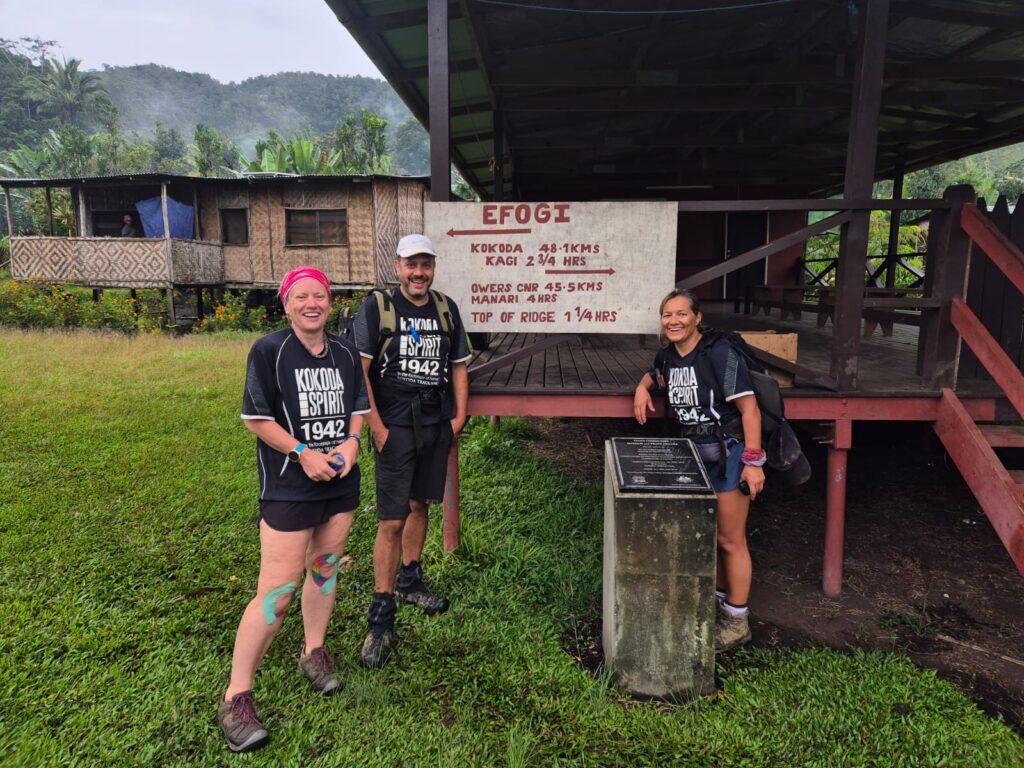
Trekkers Experience
Most trekkers describe their porters as the highlight of their Kokoda journey. Many first-time hikers arrive focused on history or fitness but leave remembering:
- A personal moment of kindness from a porter during a difficult day
- Fireside stories of wartime bravery or village life
- The laughter and songs that lifted morale through rain or exhaustion
Some trekkers stay in contact with their porters years later, supporting village projects or sponsoring education. The bonds formed on the trail are real — forged in shared hardship, sweat, and humanity.
Cultural Awareness on the Trail
Most villages along the Kokoda Trail are Seventh-day Adventist. From Friday midday to Saturday sunset, the village stalls close for Sabbath. This isn’t a disruption — it’s part of life here. Plan ahead and carry what you need.
Cultural respect also means asking before taking photos, dressing modestly in villages, and following the lead of your Porters. These are not just small courtesies — they’re essential to walking the trail with humility and awareness.
Ethical Trekking on Kokoda
You as a trekker have more influence than you might realise. Every choice you make from what you pack to the operator you book with — directly impacts the wellbeing of the porters and the local communities. Responsible trekking on Kokoda starts with awareness and small, intentional decisions.
Ethical trekking on Kokoda means:
- Sticking to the 10kg personal gear limit — don’t push excess load onto your porter. Trekkers are not permitted to carry more than 10kg in their personal pack. The remainder goes into the porter’s pack, so pack smart. Include essentials in your own bag (e.g. medication, water bottle, snacks), and avoid overloading porters with unnecessary items.
- PORTERS SHOULD NOT CARRY MORE THAN 22kgs (although many companies recommend no more than 20kg). This weight includes the Porters gear as well. Don’t be entitled, pack smart. When you enter the track you are part of a team – the group + you and your Porter.
- Asking your operator if porters are supplied with mats, sleeping bags, and ensure they pay reasonable rates.
- Tipping fairly — around 70 – 100 Kina per trekker. Ask your trekking company. A monetary tip is also standard. With Kokoda Spirit, the typical gratuity is 100 Kina per trekker for their personal porter and 100 kina for the Cooking crew. Your guide may also accept group tips on behalf of the porters.
- Bringing useful donations gifts to the Porters: battery chargers, soccer balls, torches, wet weather gear, refillable water bottles.
A small act of awareness on your part can have a big impact on someone else’s trek — and livelihood.
The Politics: KTA vs KTOA
There’s ongoing tension between the Kokoda Track Authority (KTA) — the PNG body responsible for trek permits and local development — and the Kokoda Tour Operators Association (KTOA), a group of commercial trek operators that advocate for better industry standards.
The KTA is tasked with reinvesting fees into communities and maintaining the trail, but there have been long-standing issues around accountability and funding distribution. The KTOA, on the other hand, has been criticised for pushing changes without always aligning with local expectations.
What’s clear is this: the system has cracks. And while both sides claim to want what’s best for the trail, its people, and the trekkers — those goals don’t always align.
Final Thoughts: Walk Light, Walk Respectfully
Trekking the Kokoda Trail in PNG isn’t just about ticking off a bucket list — it’s about the people who help you get there. The Porters are integral. The men who carry the weight, guide your path, and keep you going when things get tough.
As a trekker, you have power. Use it.
- Research your operator — look beyond the testimonials and check what they provide for their porters
- Ask questions — about porter conditions, food, gear, pay, and workload
- Leave honest reviews — not just “they helped me complete Kokoda” but “how did they treat the porters?”
- Support companies that walk their talk — especially those with strong ties to PNG communities and fair working standards
- Speak up if something doesn’t look right — silence is complicity
Respect for porters isn’t a bonus — it’s the baseline.
So walk light. Walk respectfully. And remember, the legacy of Kokoda is shared.
Related reading: The Kokoda Trail – What It’s Really Like for First-Time Trekkers
